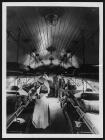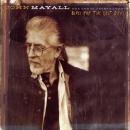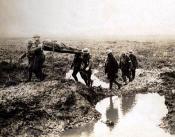The lad who went to Flanders
Otterburn, Otterburn
The lad who went to Flanders,
And never will return
Though low he lies in Flanders,
Beneath the Flemish mud,
He hears through all his dreaming
The Otterburn in flood.
And though there be in Flanders
No clear and singing streams,
The Otterburn runs singing
Of summer through his dreams.
And when peace comes to Flanders,
Because it comes too late,
He'll still lie there, and listen
To the Otterburn in spate
The lad who went to Flanders
Otterburn, Otterburn
The lad who went to Flanders,
And never will return.
Otterburn, Otterburn
The lad who went to Flanders,
And never will return
Though low he lies in Flanders,
Beneath the Flemish mud,
He hears through all his dreaming
The Otterburn in flood.
And though there be in Flanders
No clear and singing streams,
The Otterburn runs singing
Of summer through his dreams.
And when peace comes to Flanders,
Because it comes too late,
He'll still lie there, and listen
To the Otterburn in spate
The lad who went to Flanders
Otterburn, Otterburn
The lad who went to Flanders,
And never will return.
Contributed by Bernart Bartleby - 2014/4/24 - 11:55
×
![]()
Note for non-Italian users: Sorry, though the interface of this website is translated into English, most commentaries and biographies are in Italian and/or in other languages like French, German, Spanish, Russian etc.








Versi di Wilfrid Wilson Gibson (1878-1962), nella raccolta “Whin” pubblicata nel 1918.
Musica di John Jeffreys (1927-2010) talentuoso compositore che negli anni 70, purtroppo, distrusse gran parte dei suoi lavori. Solo in parte furono in seguito ricostruiti a partire da alcune registrazioni.
Una poesia scritta in memoria di un soldatino crepato nelle Fiandre, di certo un amico o conoscente di Gibson, perché il più volte citato Otterburn è un paese del Northumberland non molto lontano da Hexham, città natale del poeta inglese.
Wilfrid Wilson Gibson fu ufficiale di sua maestà, ma non combattè in prima linea e neppure lasciò mai l’Inghilterra. Eppure gran parte delle sue poesie di quel periodo descrivono le atrocità della guerra dal punto di vista del soldato semplice mandato a crepare. Anche dopo la guerra Gibson mantenne nelle sue opere un’attenzione particolare per coloro che, anche in tempo di pace, sono troppo spesso i vinti, i fregati, comunque vada…